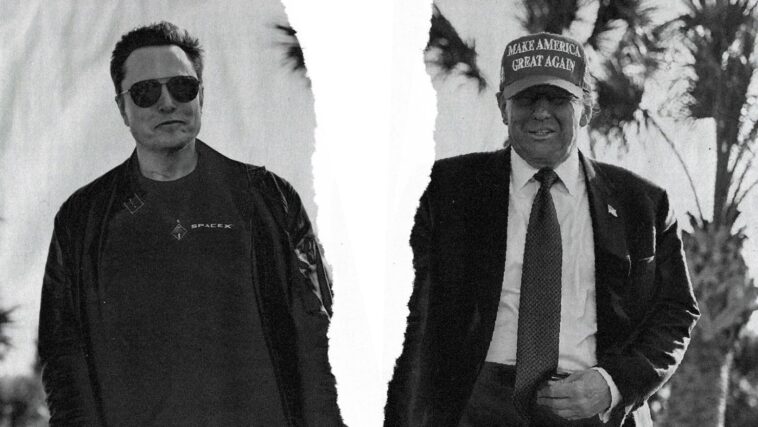An ongoing public dispute between former U.S. President Donald Trump and business magnate Elon Musk over a significant bill continues to heat up. Reports have surfaced that it might have been Trump’s team feeding inside information to a well-known newspaper, The New York Times, regarding alleged substance abuse by Musk.
Recently, The New York Times ran a piece detailing Musk’s purported drug habits, alleging they were more than just periodic. It has been inferred that the feud between Trump and Musk has grown personal, and Trump tends to reference Musk’s assumed substance abuse during their exchanges.
Trump reportedly often brings up Musk’s alleged constant drug use in their dialogues, referencing the aforementioned New York Times article as his source. There have been suggestions that Trump purports his team were the ones who alerted The New York Times to Musk’s rumored drug habits.
Notwithstanding, it has not been definitively established whether someone within Trump’s circle actually instigated the narrative or the former president was merely taking credit for the story. The New York Times article portrayed Musk as admitting to consuming excessive amounts of Ketamine, a potent anaesthetic, which supposedly was impacting his bladder functionality, a common side effect of long-term use.
Musk was also said to have consumed Ecstasy and psychedelic mushrooms, in addition to maintaining a daily medication regime that included about 20 tablets, some of which bore the imprint of the stimulant Adderall. Despite this, Musk remained silent on the matter, failing to address these accusations regarding his use of drugs.
Previously, the Tesla CEO had admitted to being prescribed Ketamine to manage his depression, explaining that he did this on a biweekly basis. However, these recent allegations seem to shed new light on his drug habits.
The feuding pair continue to exchange barbs, with Musk expressing his discontent over politicians who supported the contentious bill, despite vowing to cut spending during their campaigns. He had strong words for these lawmakers, implying that they should feel a sense of guilt for their actions.
Musk also provoked political ripples by advocating for the creation of a new political party. Alongside this, he demonstrated his determination to challenge any congressional Republicans who were backing these spending measures, thus causing additional friction within the political ecosystem.
This provoked a severe response from Trump, who retorted by questioning the subsidies granted to Musk’s businesses. He suggested a review of these financial aids with the intent to provide monetary relief to the federal government.
In light of the growing tension between two of the most influential figures in American politics and business, it remains to be seen how these developments will shape their respective futures. Both parties remain steadfast in their positions, despite the increasingly personal nature of their conflict.
The battle is further intensified by the contentious bill at the center of their dispute. Musk’s visible disappointment with the lawmakers has added another layer to this ongoing feud, presenting a stark reminder of the political implications of business decisions.
Meanwhile, Trump’s suggestion to re-evaluate the subsidies received by Musk’s companies draws attention to the intertwined relationship between the public sector and private corporations. This public dispute underlines the increasing necessity of transparency in financial matters within the corporate sector.
While the allegations of Musk’s drug habits have yet to be confirmed or refuted, they act as an additional source of tension in the ongoing conflict, widening the chasm between the two parties.
Ultimately, the future course of this dispute remains blurred as both parties maintain their hard stances. The conflict serves as a harsh reminder of the volatility that can exist in the dynamic space where the business sector intersects with politics. This situation calls for an open, fair, and transparent discourse that respects both individuals and expresses concerns about harmful habits and political disagreements.

